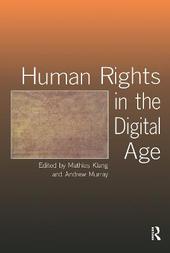
|
Human Rights in the Digital Age
Paperback
Main Details
| Title |
Human Rights in the Digital Age
|
| Authors and Contributors |
Edited by Andrew Murray
|
|
Edited by Mathias Klang
|
| Physical Properties |
| Format:Paperback | | Pages:272 | | Dimensions(mm): Height 234,Width 156 |
|
| Category/Genre | Human-computer interaction |
|---|
| ISBN/Barcode |
9781904385318
|
| Classifications | Dewey:342.41085 |
|---|
| Audience | | Tertiary Education (US: College) | | Professional & Vocational | |
|---|
| Illustrations |
black & white illustrations
|
|
Publishing Details |
| Publisher |
Taylor & Francis Ltd
|
| Imprint |
Routledge Cavendish
|
| Publication Date |
23 December 2004 |
| Publication Country |
United Kingdom
|
Description
The digital age began in 1939 with the construction of the first digital computer. In the 65 years that have followed, the influence of digitisation on our everyday lives has grown steadily and today digital technology has a greater influence on our lives than at any time since its development. This book examines the role played by digital technology in both the exercise and suppression of human rights. The global digital environment has allowed us to reinterpret the concept of universal human rights. Discourse on human rights need no longer be limited by national or cultural boundaries and individuals have the ability to create new forms in which to exercise their rights or even to bypass national limitations to rights. The defence of such rights is meanwhile under constant assault by the newfound ability of states to both suppress and control individual rights through the application of these same digital technologies. This book gathers together an international group of experts working within this rapidly developing area of law and technology and focuses their attention on the specific interaction between human rights and digital technology. This is the first work to explore the challenges brought about by digital technology to fundamental freedoms such as privacy, freedom of expression, access, assembly and dignity. It is essential reading for anyone who fears digital technology will lead to the 'Big Brother' state.
Author Biography
Mathias Klang is a lecturer and researcher in legal informatics at the University of Goteborg where he teaches courses in electronic commerce and computer ethics. His research interests are primarily in the areas of democracy, human rights and ethics in relation to technology and cyberspace. Mathias is currently working on the completion of his PhD thesis on freedom of expression in digital environments. Andrew Murray is Lecturer in IT and Internet Law at the Department of Law, London School of Economics. He teaches courses in Information Technology the Law, Internet New Media Regulation and Media Communications Regulation.
Reviews'This is an interesting read that will broaden the mind...It is a good text for academics, and those lawyers that wish to expand their knowledge beyond the routine' Computers and Law Magazine, June 2005 'The combination of "human rights" and the information revolution has never before been the focus of a specialised stand-alone publication. For this reasons alone, the book is a much welcome and long anticipated undertaking, seeking to bridge the gap in legal literature between the existing plethora of traditional human rights (HR) studies and the growing Criminal and Private Law discourse over the impact of digital technologies.' 'The linear progression of material in mutually interdependent sections allows for complex arguments to emerge, and a comprehensive picture is given of what has been achieved so far, which aspects have been ignored and what is currently being contested regarding regulatory approaches to internet governance that impact, one way or the other, with core human rights values. "Human Rights in the Digital Age" provides therefore for a practical handbook.' 'Bringing this review to a conclusion: A book on Human rights in the digitial age is timely and welcome, and this one here provides a useful overview on the role played by digital technologies within a HR environment. The non-lawyers, or indeed lawyers without previous knowledge of ICT to whom I introduced the book where rather impressed and satisfied with the account that is provided here.' Arts and Humanities Research Council online review, February 2006
|